Organizational Behavior: Culture, Motivation, Team Dynamics in GSK
VerifiedAdded on 2024/05/29
|22
|5042
|315
Report
AI Summary
This report provides an analysis of organizational behavior, focusing on the influence of culture, politics, and power on individual and team performance within GlaxoSmithKline (GSK). It evaluates content and process theories of motivation, such as Maslow's hierarchy of needs, Herzberg's two-factor theory, and equity theory, and examines how these theories and motivational techniques can enable effective achievement of organizational goals. The report also explores the characteristics of effective and ineffective teams, analyzes team development theories, and applies organizational behavior concepts to a given business situation within GSK, concluding that a positive working culture and the effective implementation of motivational theories are crucial for employee satisfaction and organizational success.
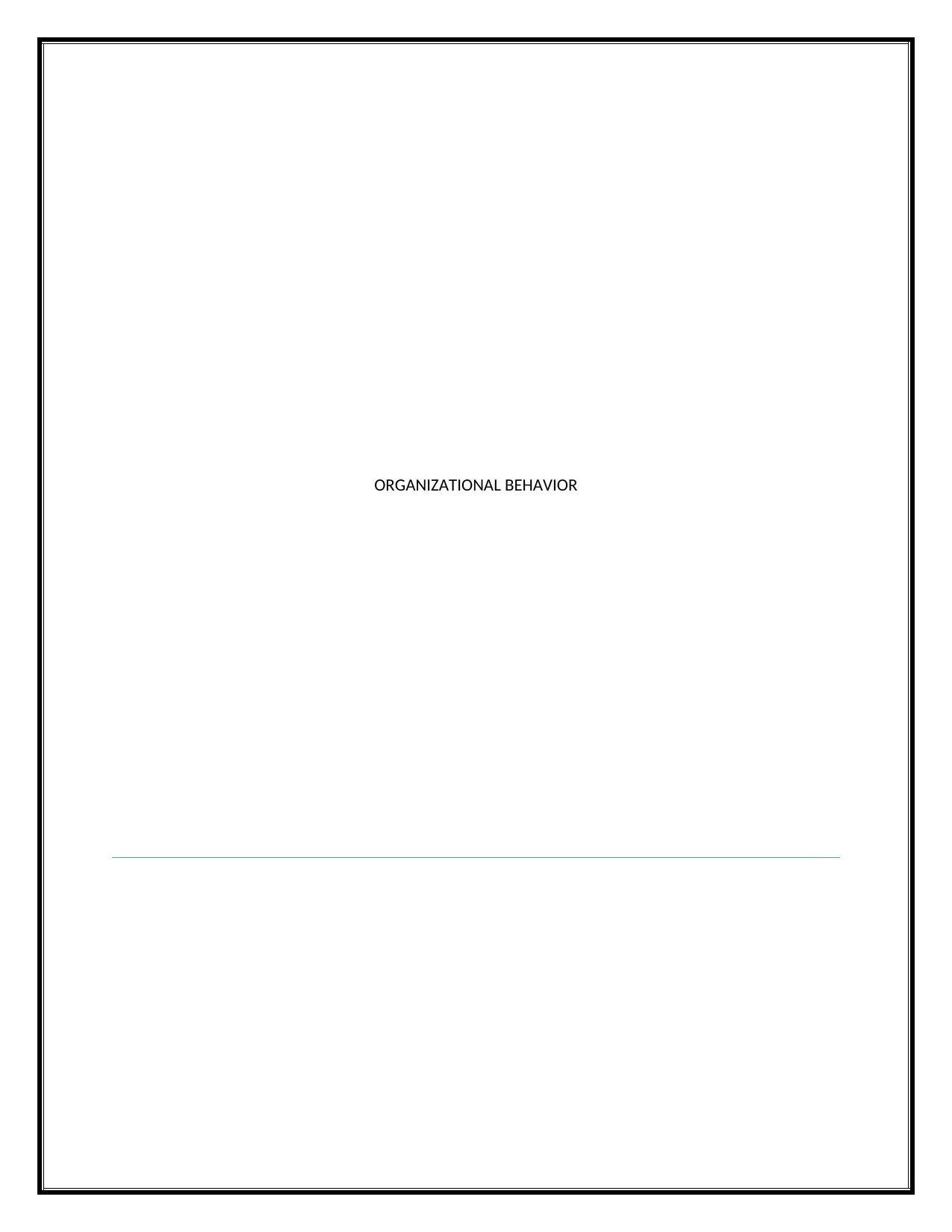
ORGANIZATIONAL BEHAVIOR
Paraphrase This Document
Need a fresh take? Get an instant paraphrase of this document with our AI Paraphraser
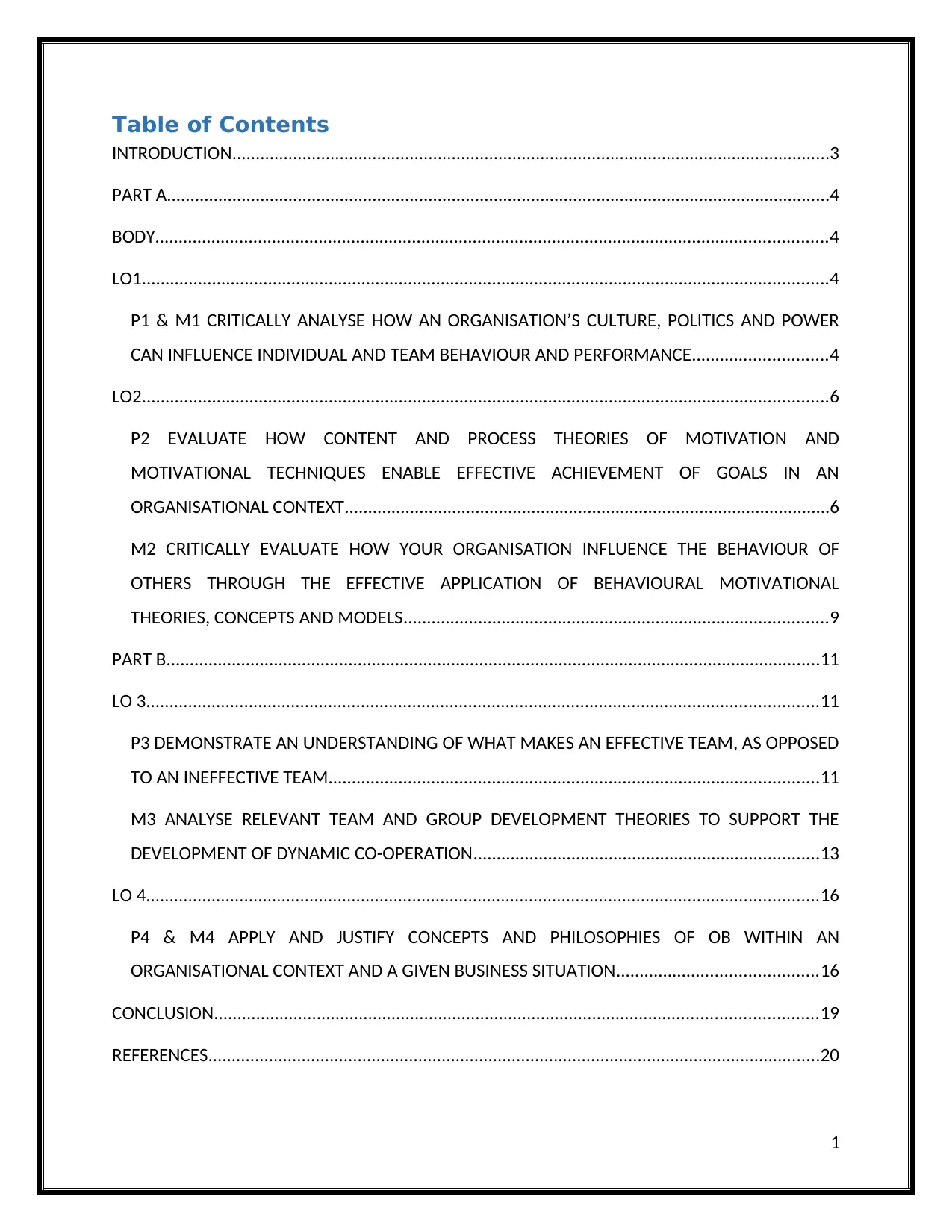
Table of Contents
INTRODUCTION................................................................................................................................3
PART A..............................................................................................................................................4
BODY................................................................................................................................................4
LO1...................................................................................................................................................4
P1 & M1 CRITICALLY ANALYSE HOW AN ORGANISATION’S CULTURE, POLITICS AND POWER
CAN INFLUENCE INDIVIDUAL AND TEAM BEHAVIOUR AND PERFORMANCE.............................4
LO2...................................................................................................................................................6
P2 EVALUATE HOW CONTENT AND PROCESS THEORIES OF MOTIVATION AND
MOTIVATIONAL TECHNIQUES ENABLE EFFECTIVE ACHIEVEMENT OF GOALS IN AN
ORGANISATIONAL CONTEXT........................................................................................................6
M2 CRITICALLY EVALUATE HOW YOUR ORGANISATION INFLUENCE THE BEHAVIOUR OF
OTHERS THROUGH THE EFFECTIVE APPLICATION OF BEHAVIOURAL MOTIVATIONAL
THEORIES, CONCEPTS AND MODELS...........................................................................................9
PART B............................................................................................................................................11
LO 3................................................................................................................................................11
P3 DEMONSTRATE AN UNDERSTANDING OF WHAT MAKES AN EFFECTIVE TEAM, AS OPPOSED
TO AN INEFFECTIVE TEAM.........................................................................................................11
M3 ANALYSE RELEVANT TEAM AND GROUP DEVELOPMENT THEORIES TO SUPPORT THE
DEVELOPMENT OF DYNAMIC CO-OPERATION..........................................................................13
LO 4................................................................................................................................................16
P4 & M4 APPLY AND JUSTIFY CONCEPTS AND PHILOSOPHIES OF OB WITHIN AN
ORGANISATIONAL CONTEXT AND A GIVEN BUSINESS SITUATION...........................................16
CONCLUSION.................................................................................................................................19
REFERENCES...................................................................................................................................20
1
INTRODUCTION................................................................................................................................3
PART A..............................................................................................................................................4
BODY................................................................................................................................................4
LO1...................................................................................................................................................4
P1 & M1 CRITICALLY ANALYSE HOW AN ORGANISATION’S CULTURE, POLITICS AND POWER
CAN INFLUENCE INDIVIDUAL AND TEAM BEHAVIOUR AND PERFORMANCE.............................4
LO2...................................................................................................................................................6
P2 EVALUATE HOW CONTENT AND PROCESS THEORIES OF MOTIVATION AND
MOTIVATIONAL TECHNIQUES ENABLE EFFECTIVE ACHIEVEMENT OF GOALS IN AN
ORGANISATIONAL CONTEXT........................................................................................................6
M2 CRITICALLY EVALUATE HOW YOUR ORGANISATION INFLUENCE THE BEHAVIOUR OF
OTHERS THROUGH THE EFFECTIVE APPLICATION OF BEHAVIOURAL MOTIVATIONAL
THEORIES, CONCEPTS AND MODELS...........................................................................................9
PART B............................................................................................................................................11
LO 3................................................................................................................................................11
P3 DEMONSTRATE AN UNDERSTANDING OF WHAT MAKES AN EFFECTIVE TEAM, AS OPPOSED
TO AN INEFFECTIVE TEAM.........................................................................................................11
M3 ANALYSE RELEVANT TEAM AND GROUP DEVELOPMENT THEORIES TO SUPPORT THE
DEVELOPMENT OF DYNAMIC CO-OPERATION..........................................................................13
LO 4................................................................................................................................................16
P4 & M4 APPLY AND JUSTIFY CONCEPTS AND PHILOSOPHIES OF OB WITHIN AN
ORGANISATIONAL CONTEXT AND A GIVEN BUSINESS SITUATION...........................................16
CONCLUSION.................................................................................................................................19
REFERENCES...................................................................................................................................20
1
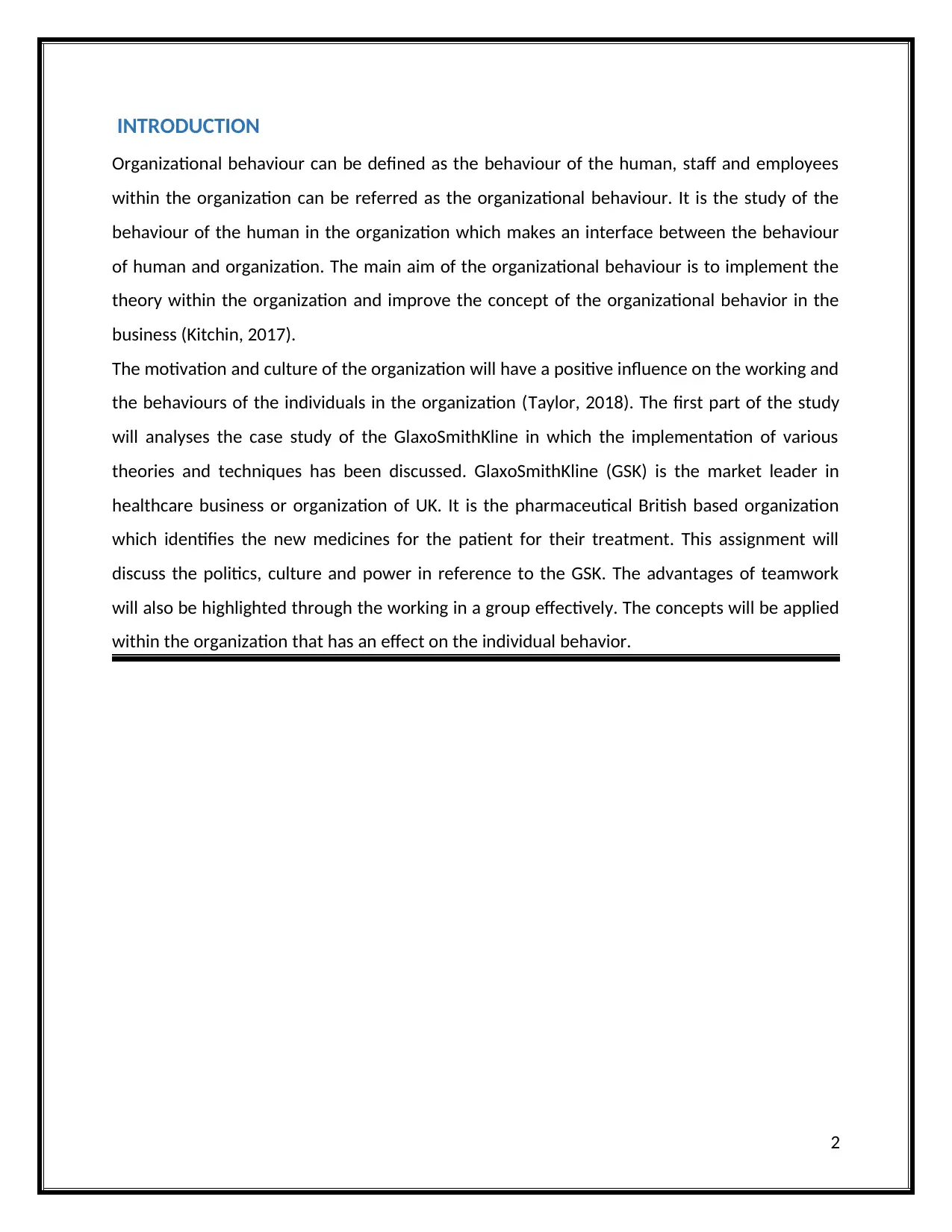
INTRODUCTION
Organizational behaviour can be defined as the behaviour of the human, staff and employees
within the organization can be referred as the organizational behaviour. It is the study of the
behaviour of the human in the organization which makes an interface between the behaviour
of human and organization. The main aim of the organizational behaviour is to implement the
theory within the organization and improve the concept of the organizational behavior in the
business (Kitchin, 2017).
The motivation and culture of the organization will have a positive influence on the working and
the behaviours of the individuals in the organization (Taylor, 2018). The first part of the study
will analyses the case study of the GlaxoSmithKline in which the implementation of various
theories and techniques has been discussed. GlaxoSmithKline (GSK) is the market leader in
healthcare business or organization of UK. It is the pharmaceutical British based organization
which identifies the new medicines for the patient for their treatment. This assignment will
discuss the politics, culture and power in reference to the GSK. The advantages of teamwork
will also be highlighted through the working in a group effectively. The concepts will be applied
within the organization that has an effect on the individual behavior.
2
Organizational behaviour can be defined as the behaviour of the human, staff and employees
within the organization can be referred as the organizational behaviour. It is the study of the
behaviour of the human in the organization which makes an interface between the behaviour
of human and organization. The main aim of the organizational behaviour is to implement the
theory within the organization and improve the concept of the organizational behavior in the
business (Kitchin, 2017).
The motivation and culture of the organization will have a positive influence on the working and
the behaviours of the individuals in the organization (Taylor, 2018). The first part of the study
will analyses the case study of the GlaxoSmithKline in which the implementation of various
theories and techniques has been discussed. GlaxoSmithKline (GSK) is the market leader in
healthcare business or organization of UK. It is the pharmaceutical British based organization
which identifies the new medicines for the patient for their treatment. This assignment will
discuss the politics, culture and power in reference to the GSK. The advantages of teamwork
will also be highlighted through the working in a group effectively. The concepts will be applied
within the organization that has an effect on the individual behavior.
2
⊘ This is a preview!⊘
Do you want full access?
Subscribe today to unlock all pages.

Trusted by 1+ million students worldwide
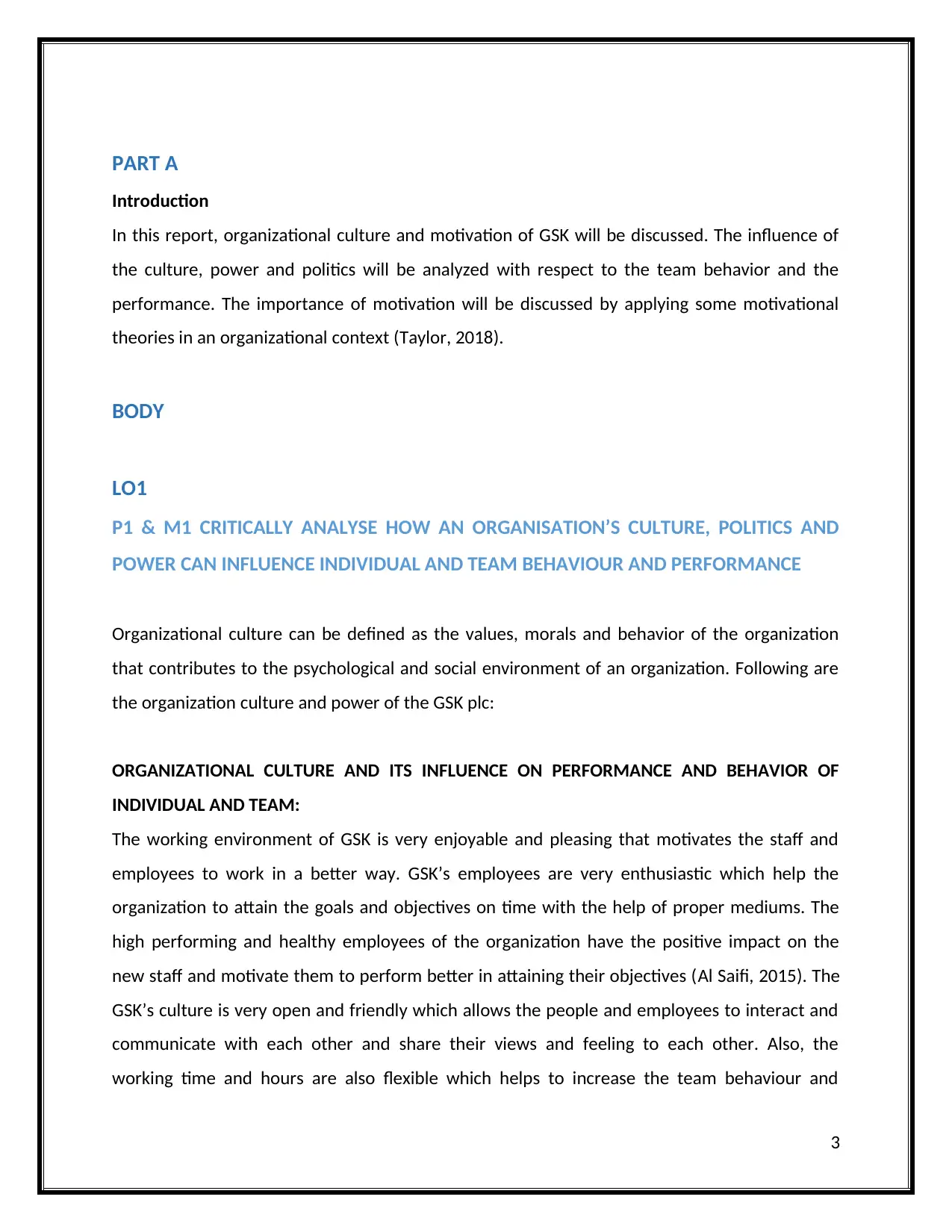
PART A
Introduction
In this report, organizational culture and motivation of GSK will be discussed. The influence of
the culture, power and politics will be analyzed with respect to the team behavior and the
performance. The importance of motivation will be discussed by applying some motivational
theories in an organizational context (Taylor, 2018).
BODY
LO1
P1 & M1 CRITICALLY ANALYSE HOW AN ORGANISATION’S CULTURE, POLITICS AND
POWER CAN INFLUENCE INDIVIDUAL AND TEAM BEHAVIOUR AND PERFORMANCE
Organizational culture can be defined as the values, morals and behavior of the organization
that contributes to the psychological and social environment of an organization. Following are
the organization culture and power of the GSK plc:
ORGANIZATIONAL CULTURE AND ITS INFLUENCE ON PERFORMANCE AND BEHAVIOR OF
INDIVIDUAL AND TEAM:
The working environment of GSK is very enjoyable and pleasing that motivates the staff and
employees to work in a better way. GSK’s employees are very enthusiastic which help the
organization to attain the goals and objectives on time with the help of proper mediums. The
high performing and healthy employees of the organization have the positive impact on the
new staff and motivate them to perform better in attaining their objectives (Al Saifi, 2015). The
GSK’s culture is very open and friendly which allows the people and employees to interact and
communicate with each other and share their views and feeling to each other. Also, the
working time and hours are also flexible which helps to increase the team behaviour and
3
Introduction
In this report, organizational culture and motivation of GSK will be discussed. The influence of
the culture, power and politics will be analyzed with respect to the team behavior and the
performance. The importance of motivation will be discussed by applying some motivational
theories in an organizational context (Taylor, 2018).
BODY
LO1
P1 & M1 CRITICALLY ANALYSE HOW AN ORGANISATION’S CULTURE, POLITICS AND
POWER CAN INFLUENCE INDIVIDUAL AND TEAM BEHAVIOUR AND PERFORMANCE
Organizational culture can be defined as the values, morals and behavior of the organization
that contributes to the psychological and social environment of an organization. Following are
the organization culture and power of the GSK plc:
ORGANIZATIONAL CULTURE AND ITS INFLUENCE ON PERFORMANCE AND BEHAVIOR OF
INDIVIDUAL AND TEAM:
The working environment of GSK is very enjoyable and pleasing that motivates the staff and
employees to work in a better way. GSK’s employees are very enthusiastic which help the
organization to attain the goals and objectives on time with the help of proper mediums. The
high performing and healthy employees of the organization have the positive impact on the
new staff and motivate them to perform better in attaining their objectives (Al Saifi, 2015). The
GSK’s culture is very open and friendly which allows the people and employees to interact and
communicate with each other and share their views and feeling to each other. Also, the
working time and hours are also flexible which helps to increase the team behaviour and
3
Paraphrase This Document
Need a fresh take? Get an instant paraphrase of this document with our AI Paraphraser
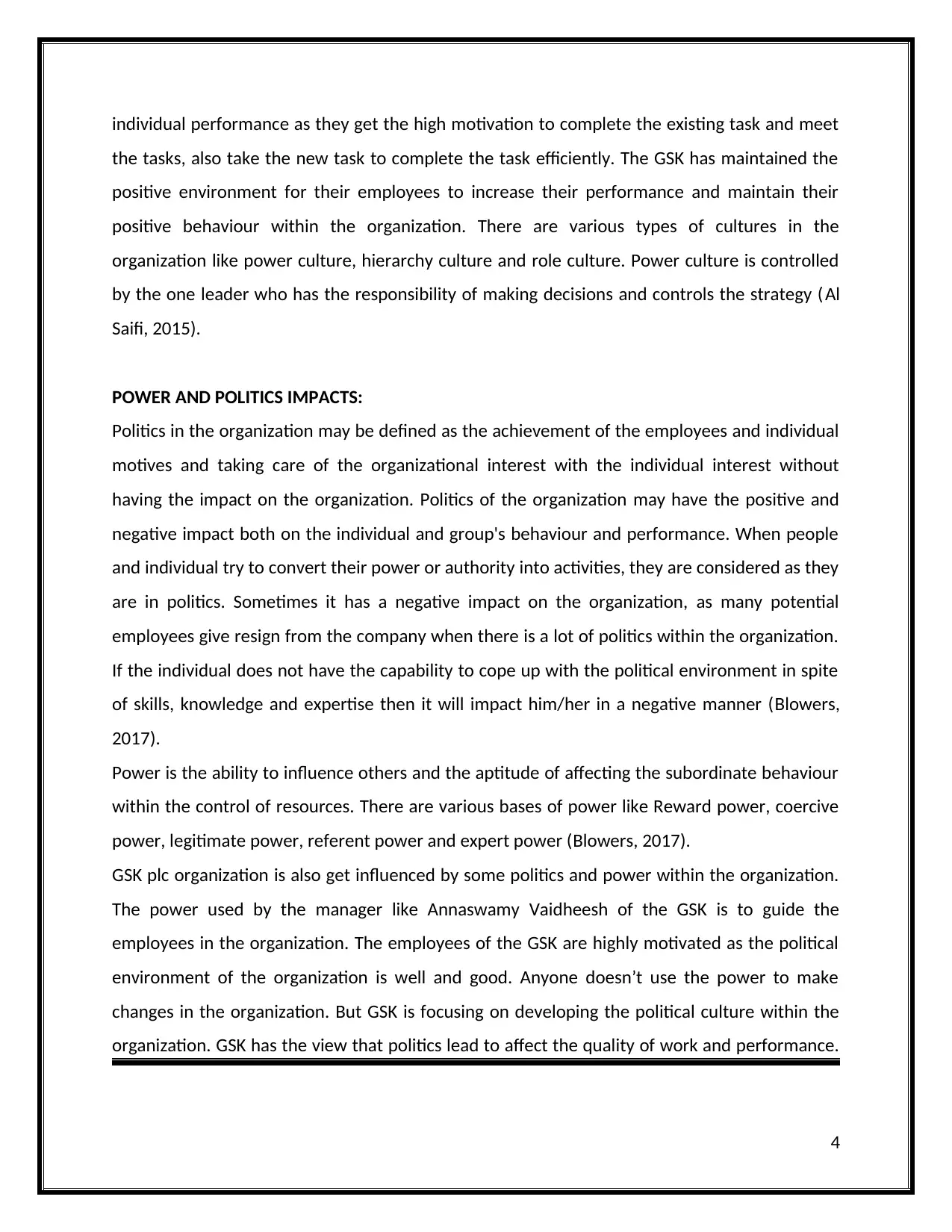
individual performance as they get the high motivation to complete the existing task and meet
the tasks, also take the new task to complete the task efficiently. The GSK has maintained the
positive environment for their employees to increase their performance and maintain their
positive behaviour within the organization. There are various types of cultures in the
organization like power culture, hierarchy culture and role culture. Power culture is controlled
by the one leader who has the responsibility of making decisions and controls the strategy (Al
Saifi, 2015).
POWER AND POLITICS IMPACTS:
Politics in the organization may be defined as the achievement of the employees and individual
motives and taking care of the organizational interest with the individual interest without
having the impact on the organization. Politics of the organization may have the positive and
negative impact both on the individual and group's behaviour and performance. When people
and individual try to convert their power or authority into activities, they are considered as they
are in politics. Sometimes it has a negative impact on the organization, as many potential
employees give resign from the company when there is a lot of politics within the organization.
If the individual does not have the capability to cope up with the political environment in spite
of skills, knowledge and expertise then it will impact him/her in a negative manner (Blowers,
2017).
Power is the ability to influence others and the aptitude of affecting the subordinate behaviour
within the control of resources. There are various bases of power like Reward power, coercive
power, legitimate power, referent power and expert power (Blowers, 2017).
GSK plc organization is also get influenced by some politics and power within the organization.
The power used by the manager like Annaswamy Vaidheesh of the GSK is to guide the
employees in the organization. The employees of the GSK are highly motivated as the political
environment of the organization is well and good. Anyone doesn’t use the power to make
changes in the organization. But GSK is focusing on developing the political culture within the
organization. GSK has the view that politics lead to affect the quality of work and performance.
4
the tasks, also take the new task to complete the task efficiently. The GSK has maintained the
positive environment for their employees to increase their performance and maintain their
positive behaviour within the organization. There are various types of cultures in the
organization like power culture, hierarchy culture and role culture. Power culture is controlled
by the one leader who has the responsibility of making decisions and controls the strategy (Al
Saifi, 2015).
POWER AND POLITICS IMPACTS:
Politics in the organization may be defined as the achievement of the employees and individual
motives and taking care of the organizational interest with the individual interest without
having the impact on the organization. Politics of the organization may have the positive and
negative impact both on the individual and group's behaviour and performance. When people
and individual try to convert their power or authority into activities, they are considered as they
are in politics. Sometimes it has a negative impact on the organization, as many potential
employees give resign from the company when there is a lot of politics within the organization.
If the individual does not have the capability to cope up with the political environment in spite
of skills, knowledge and expertise then it will impact him/her in a negative manner (Blowers,
2017).
Power is the ability to influence others and the aptitude of affecting the subordinate behaviour
within the control of resources. There are various bases of power like Reward power, coercive
power, legitimate power, referent power and expert power (Blowers, 2017).
GSK plc organization is also get influenced by some politics and power within the organization.
The power used by the manager like Annaswamy Vaidheesh of the GSK is to guide the
employees in the organization. The employees of the GSK are highly motivated as the political
environment of the organization is well and good. Anyone doesn’t use the power to make
changes in the organization. But GSK is focusing on developing the political culture within the
organization. GSK has the view that politics lead to affect the quality of work and performance.
4
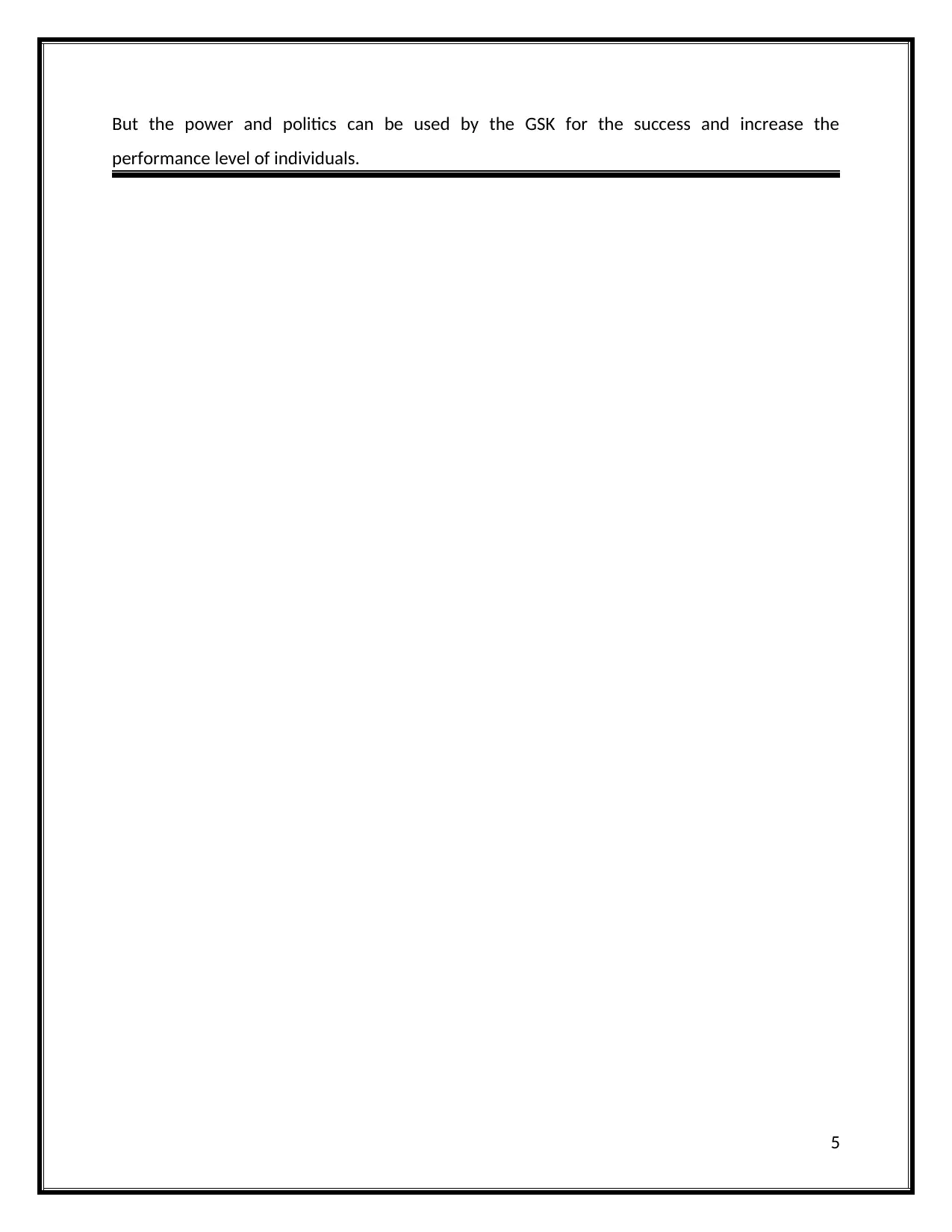
But the power and politics can be used by the GSK for the success and increase the
performance level of individuals.
5
performance level of individuals.
5
⊘ This is a preview!⊘
Do you want full access?
Subscribe today to unlock all pages.

Trusted by 1+ million students worldwide
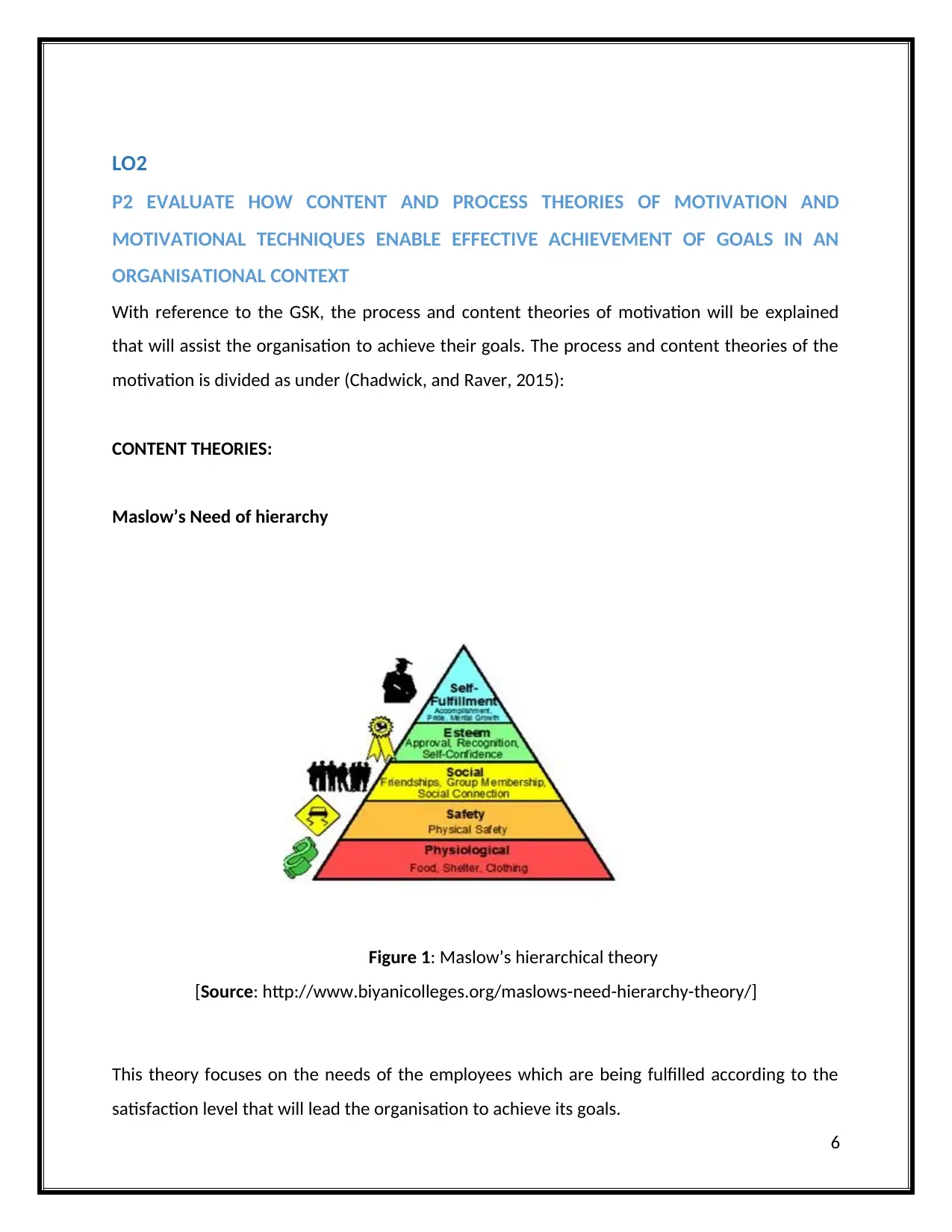
LO2
P2 EVALUATE HOW CONTENT AND PROCESS THEORIES OF MOTIVATION AND
MOTIVATIONAL TECHNIQUES ENABLE EFFECTIVE ACHIEVEMENT OF GOALS IN AN
ORGANISATIONAL CONTEXT
With reference to the GSK, the process and content theories of motivation will be explained
that will assist the organisation to achieve their goals. The process and content theories of the
motivation is divided as under (Chadwick, and Raver, 2015):
CONTENT THEORIES:
Maslow’s Need of hierarchy
Figure 1: Maslow’s hierarchical theory
[Source: http://www.biyanicolleges.org/maslows-need-hierarchy-theory/]
This theory focuses on the needs of the employees which are being fulfilled according to the
satisfaction level that will lead the organisation to achieve its goals.
6
P2 EVALUATE HOW CONTENT AND PROCESS THEORIES OF MOTIVATION AND
MOTIVATIONAL TECHNIQUES ENABLE EFFECTIVE ACHIEVEMENT OF GOALS IN AN
ORGANISATIONAL CONTEXT
With reference to the GSK, the process and content theories of motivation will be explained
that will assist the organisation to achieve their goals. The process and content theories of the
motivation is divided as under (Chadwick, and Raver, 2015):
CONTENT THEORIES:
Maslow’s Need of hierarchy
Figure 1: Maslow’s hierarchical theory
[Source: http://www.biyanicolleges.org/maslows-need-hierarchy-theory/]
This theory focuses on the needs of the employees which are being fulfilled according to the
satisfaction level that will lead the organisation to achieve its goals.
6
Paraphrase This Document
Need a fresh take? Get an instant paraphrase of this document with our AI Paraphraser
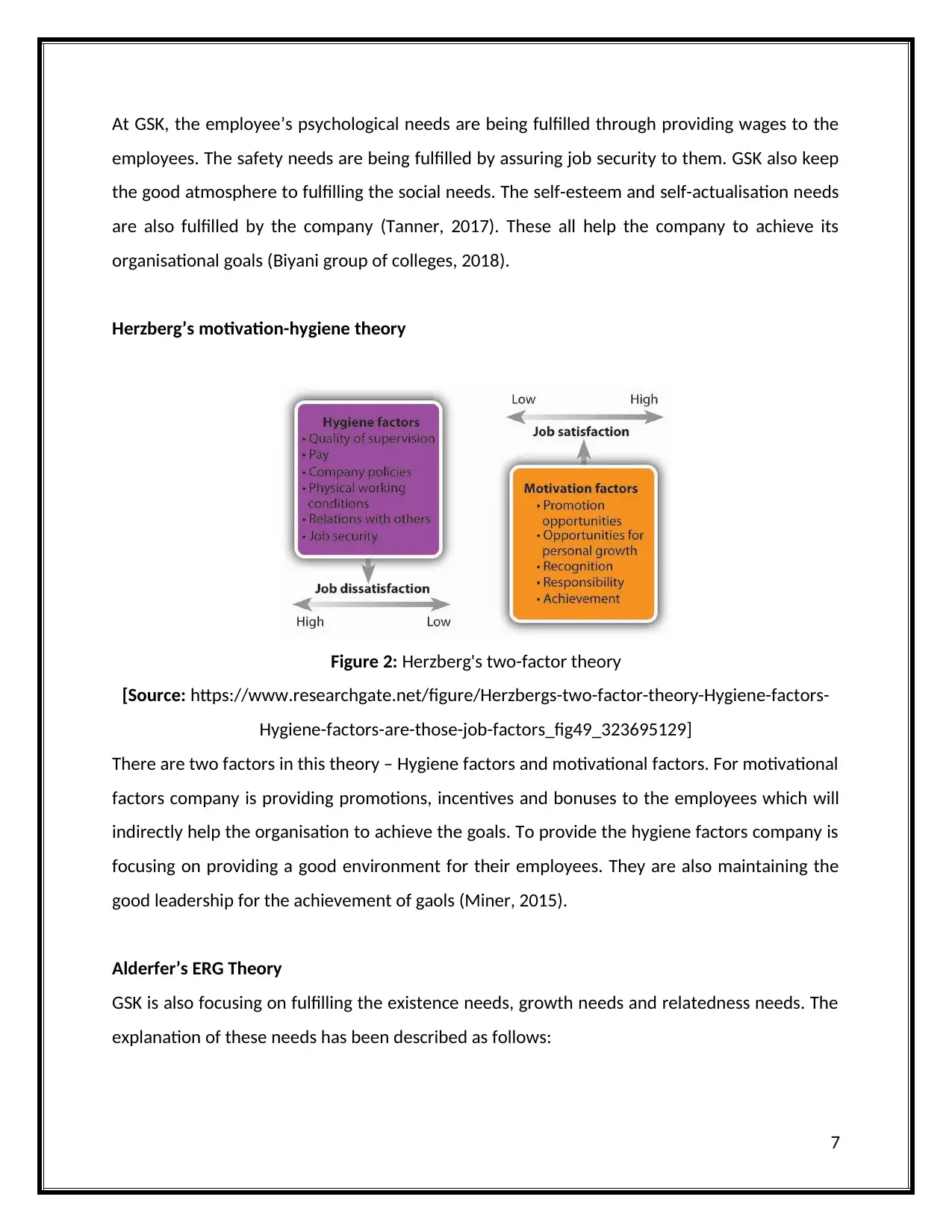
At GSK, the employee’s psychological needs are being fulfilled through providing wages to the
employees. The safety needs are being fulfilled by assuring job security to them. GSK also keep
the good atmosphere to fulfilling the social needs. The self-esteem and self-actualisation needs
are also fulfilled by the company (Tanner, 2017). These all help the company to achieve its
organisational goals (Biyani group of colleges, 2018).
Herzberg’s motivation-hygiene theory
Figure 2: Herzberg's two-factor theory
[Source: https://www.researchgate.net/figure/Herzbergs-two-factor-theory-Hygiene-factors-
Hygiene-factors-are-those-job-factors_fig49_323695129]
There are two factors in this theory – Hygiene factors and motivational factors. For motivational
factors company is providing promotions, incentives and bonuses to the employees which will
indirectly help the organisation to achieve the goals. To provide the hygiene factors company is
focusing on providing a good environment for their employees. They are also maintaining the
good leadership for the achievement of gaols (Miner, 2015).
Alderfer’s ERG Theory
GSK is also focusing on fulfilling the existence needs, growth needs and relatedness needs. The
explanation of these needs has been described as follows:
7
employees. The safety needs are being fulfilled by assuring job security to them. GSK also keep
the good atmosphere to fulfilling the social needs. The self-esteem and self-actualisation needs
are also fulfilled by the company (Tanner, 2017). These all help the company to achieve its
organisational goals (Biyani group of colleges, 2018).
Herzberg’s motivation-hygiene theory
Figure 2: Herzberg's two-factor theory
[Source: https://www.researchgate.net/figure/Herzbergs-two-factor-theory-Hygiene-factors-
Hygiene-factors-are-those-job-factors_fig49_323695129]
There are two factors in this theory – Hygiene factors and motivational factors. For motivational
factors company is providing promotions, incentives and bonuses to the employees which will
indirectly help the organisation to achieve the goals. To provide the hygiene factors company is
focusing on providing a good environment for their employees. They are also maintaining the
good leadership for the achievement of gaols (Miner, 2015).
Alderfer’s ERG Theory
GSK is also focusing on fulfilling the existence needs, growth needs and relatedness needs. The
explanation of these needs has been described as follows:
7
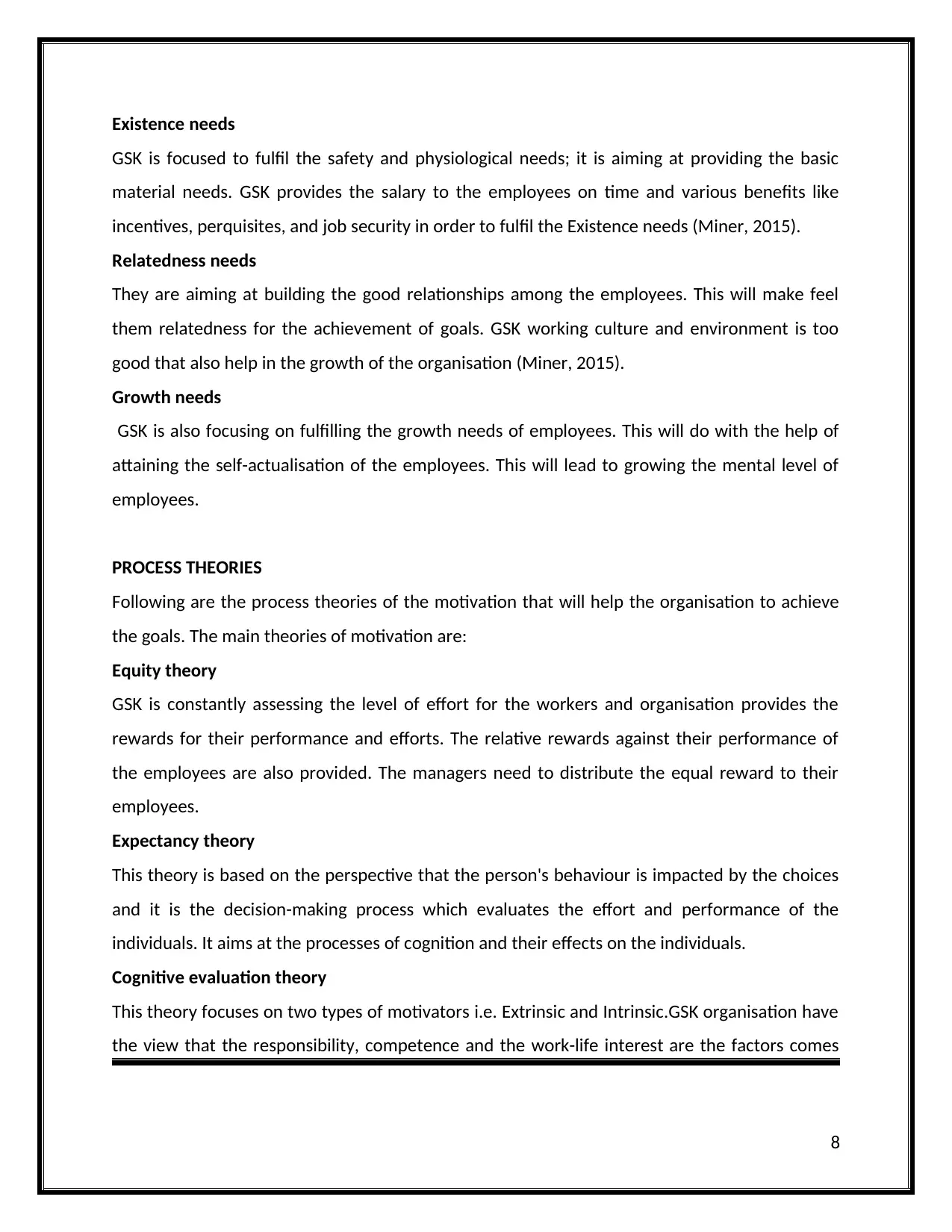
Existence needs
GSK is focused to fulfil the safety and physiological needs; it is aiming at providing the basic
material needs. GSK provides the salary to the employees on time and various benefits like
incentives, perquisites, and job security in order to fulfil the Existence needs (Miner, 2015).
Relatedness needs
They are aiming at building the good relationships among the employees. This will make feel
them relatedness for the achievement of goals. GSK working culture and environment is too
good that also help in the growth of the organisation (Miner, 2015).
Growth needs
GSK is also focusing on fulfilling the growth needs of employees. This will do with the help of
attaining the self-actualisation of the employees. This will lead to growing the mental level of
employees.
PROCESS THEORIES
Following are the process theories of the motivation that will help the organisation to achieve
the goals. The main theories of motivation are:
Equity theory
GSK is constantly assessing the level of effort for the workers and organisation provides the
rewards for their performance and efforts. The relative rewards against their performance of
the employees are also provided. The managers need to distribute the equal reward to their
employees.
Expectancy theory
This theory is based on the perspective that the person's behaviour is impacted by the choices
and it is the decision-making process which evaluates the effort and performance of the
individuals. It aims at the processes of cognition and their effects on the individuals.
Cognitive evaluation theory
This theory focuses on two types of motivators i.e. Extrinsic and Intrinsic.GSK organisation have
the view that the responsibility, competence and the work-life interest are the factors comes
8
GSK is focused to fulfil the safety and physiological needs; it is aiming at providing the basic
material needs. GSK provides the salary to the employees on time and various benefits like
incentives, perquisites, and job security in order to fulfil the Existence needs (Miner, 2015).
Relatedness needs
They are aiming at building the good relationships among the employees. This will make feel
them relatedness for the achievement of goals. GSK working culture and environment is too
good that also help in the growth of the organisation (Miner, 2015).
Growth needs
GSK is also focusing on fulfilling the growth needs of employees. This will do with the help of
attaining the self-actualisation of the employees. This will lead to growing the mental level of
employees.
PROCESS THEORIES
Following are the process theories of the motivation that will help the organisation to achieve
the goals. The main theories of motivation are:
Equity theory
GSK is constantly assessing the level of effort for the workers and organisation provides the
rewards for their performance and efforts. The relative rewards against their performance of
the employees are also provided. The managers need to distribute the equal reward to their
employees.
Expectancy theory
This theory is based on the perspective that the person's behaviour is impacted by the choices
and it is the decision-making process which evaluates the effort and performance of the
individuals. It aims at the processes of cognition and their effects on the individuals.
Cognitive evaluation theory
This theory focuses on two types of motivators i.e. Extrinsic and Intrinsic.GSK organisation have
the view that the responsibility, competence and the work-life interest are the factors comes
8
⊘ This is a preview!⊘
Do you want full access?
Subscribe today to unlock all pages.

Trusted by 1+ million students worldwide
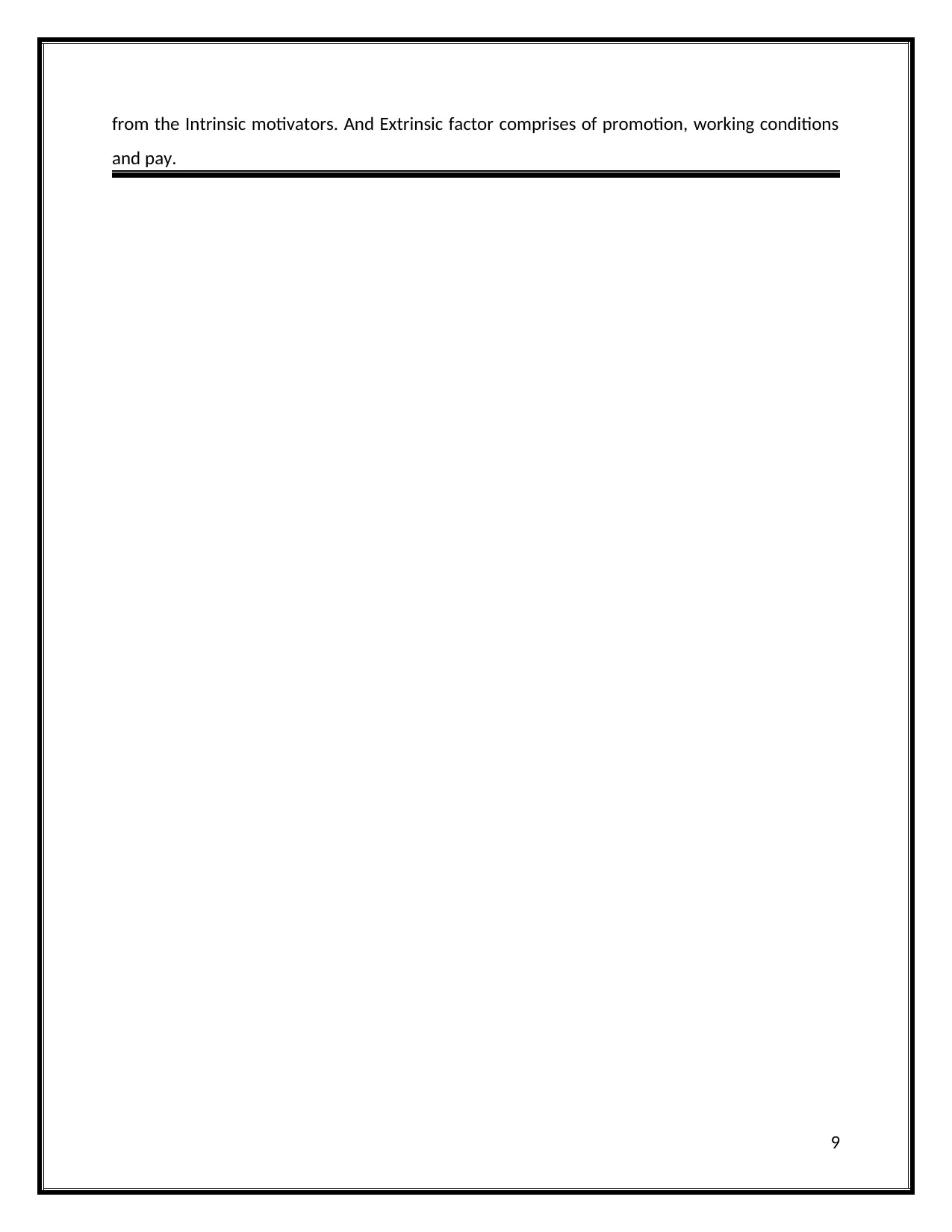
from the Intrinsic motivators. And Extrinsic factor comprises of promotion, working conditions
and pay.
9
and pay.
9
Paraphrase This Document
Need a fresh take? Get an instant paraphrase of this document with our AI Paraphraser
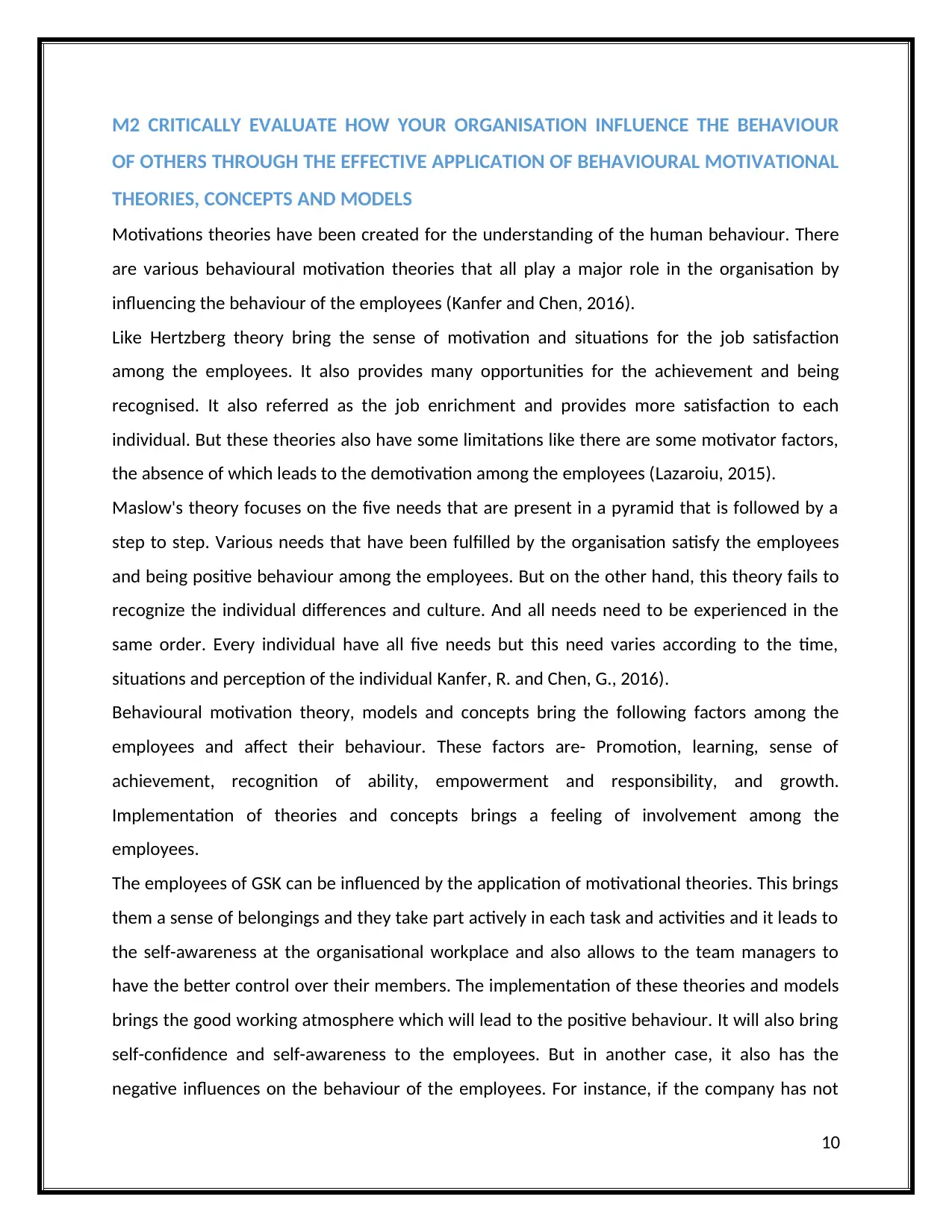
M2 CRITICALLY EVALUATE HOW YOUR ORGANISATION INFLUENCE THE BEHAVIOUR
OF OTHERS THROUGH THE EFFECTIVE APPLICATION OF BEHAVIOURAL MOTIVATIONAL
THEORIES, CONCEPTS AND MODELS
Motivations theories have been created for the understanding of the human behaviour. There
are various behavioural motivation theories that all play a major role in the organisation by
influencing the behaviour of the employees (Kanfer and Chen, 2016).
Like Hertzberg theory bring the sense of motivation and situations for the job satisfaction
among the employees. It also provides many opportunities for the achievement and being
recognised. It also referred as the job enrichment and provides more satisfaction to each
individual. But these theories also have some limitations like there are some motivator factors,
the absence of which leads to the demotivation among the employees (Lazaroiu, 2015).
Maslow's theory focuses on the five needs that are present in a pyramid that is followed by a
step to step. Various needs that have been fulfilled by the organisation satisfy the employees
and being positive behaviour among the employees. But on the other hand, this theory fails to
recognize the individual differences and culture. And all needs need to be experienced in the
same order. Every individual have all five needs but this need varies according to the time,
situations and perception of the individual Kanfer, R. and Chen, G., 2016).
Behavioural motivation theory, models and concepts bring the following factors among the
employees and affect their behaviour. These factors are- Promotion, learning, sense of
achievement, recognition of ability, empowerment and responsibility, and growth.
Implementation of theories and concepts brings a feeling of involvement among the
employees.
The employees of GSK can be influenced by the application of motivational theories. This brings
them a sense of belongings and they take part actively in each task and activities and it leads to
the self-awareness at the organisational workplace and also allows to the team managers to
have the better control over their members. The implementation of these theories and models
brings the good working atmosphere which will lead to the positive behaviour. It will also bring
self-confidence and self-awareness to the employees. But in another case, it also has the
negative influences on the behaviour of the employees. For instance, if the company has not
10
OF OTHERS THROUGH THE EFFECTIVE APPLICATION OF BEHAVIOURAL MOTIVATIONAL
THEORIES, CONCEPTS AND MODELS
Motivations theories have been created for the understanding of the human behaviour. There
are various behavioural motivation theories that all play a major role in the organisation by
influencing the behaviour of the employees (Kanfer and Chen, 2016).
Like Hertzberg theory bring the sense of motivation and situations for the job satisfaction
among the employees. It also provides many opportunities for the achievement and being
recognised. It also referred as the job enrichment and provides more satisfaction to each
individual. But these theories also have some limitations like there are some motivator factors,
the absence of which leads to the demotivation among the employees (Lazaroiu, 2015).
Maslow's theory focuses on the five needs that are present in a pyramid that is followed by a
step to step. Various needs that have been fulfilled by the organisation satisfy the employees
and being positive behaviour among the employees. But on the other hand, this theory fails to
recognize the individual differences and culture. And all needs need to be experienced in the
same order. Every individual have all five needs but this need varies according to the time,
situations and perception of the individual Kanfer, R. and Chen, G., 2016).
Behavioural motivation theory, models and concepts bring the following factors among the
employees and affect their behaviour. These factors are- Promotion, learning, sense of
achievement, recognition of ability, empowerment and responsibility, and growth.
Implementation of theories and concepts brings a feeling of involvement among the
employees.
The employees of GSK can be influenced by the application of motivational theories. This brings
them a sense of belongings and they take part actively in each task and activities and it leads to
the self-awareness at the organisational workplace and also allows to the team managers to
have the better control over their members. The implementation of these theories and models
brings the good working atmosphere which will lead to the positive behaviour. It will also bring
self-confidence and self-awareness to the employees. But in another case, it also has the
negative influences on the behaviour of the employees. For instance, if the company has not
10
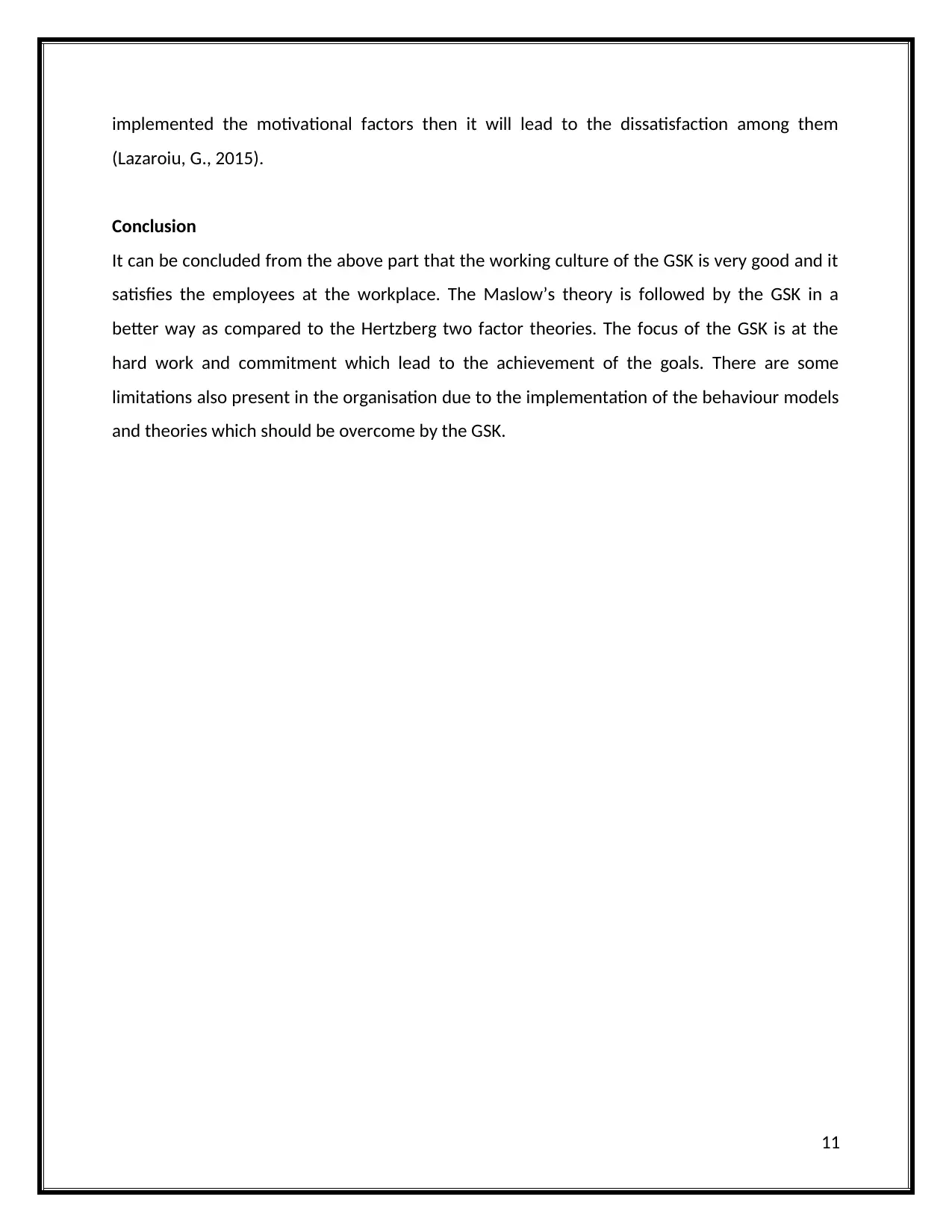
implemented the motivational factors then it will lead to the dissatisfaction among them
(Lazaroiu, G., 2015).
Conclusion
It can be concluded from the above part that the working culture of the GSK is very good and it
satisfies the employees at the workplace. The Maslow’s theory is followed by the GSK in a
better way as compared to the Hertzberg two factor theories. The focus of the GSK is at the
hard work and commitment which lead to the achievement of the goals. There are some
limitations also present in the organisation due to the implementation of the behaviour models
and theories which should be overcome by the GSK.
11
(Lazaroiu, G., 2015).
Conclusion
It can be concluded from the above part that the working culture of the GSK is very good and it
satisfies the employees at the workplace. The Maslow’s theory is followed by the GSK in a
better way as compared to the Hertzberg two factor theories. The focus of the GSK is at the
hard work and commitment which lead to the achievement of the goals. There are some
limitations also present in the organisation due to the implementation of the behaviour models
and theories which should be overcome by the GSK.
11
⊘ This is a preview!⊘
Do you want full access?
Subscribe today to unlock all pages.

Trusted by 1+ million students worldwide
1 out of 22
Related Documents
Your All-in-One AI-Powered Toolkit for Academic Success.
+13062052269
info@desklib.com
Available 24*7 on WhatsApp / Email
![[object Object]](/_next/static/media/star-bottom.7253800d.svg)
Unlock your academic potential
Copyright © 2020–2026 A2Z Services. All Rights Reserved. Developed and managed by ZUCOL.





